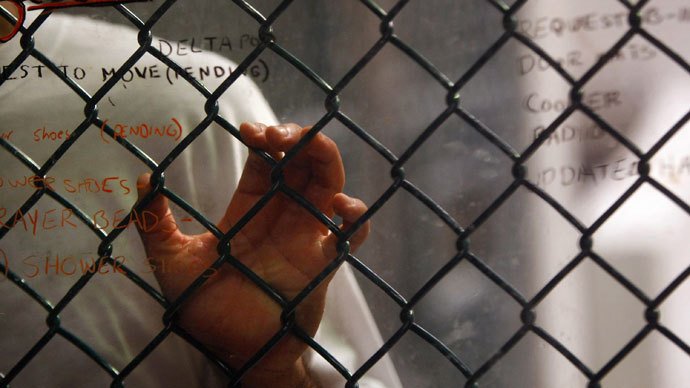‘Force-feeding Gitmo prisoners contradicts medical ethics’

Force-feeding people during a voluntary hunger strike is considered an abuse of the Hippocratic Oath, and medical personnel at Gitmo should not follow orders that violate their ethical principles, psychiatrist Terry Kupers told RT.
If the hunger strike continues in Guantanamo, inmates will most
likely face irreversible organ damage and eventually death, Terry
Kupers, psychiatrist and consultant for Human Rights Watch says.
But force-feeding the prisoners also contradicts medical ethics
and this aggravated assault alongside other abuses, psychiatrist
argues, will result in “permanent psychological damage.”
Over 150 medical professionals have signed an open letter calling
on US President Barack Obama to allow prisoners at the Guantanamo
Bay detention center to receive independent medical care.
RT:How likely is it that there will be a response to
the doctors' petition and that they will actually be allowed to
examine Guantanamo detainees?
Terry Kupers: I’m pessimistic that they will be allowed in.
If they are allowed in, they will act in an ethical fashion and
the situation of the prisoners will improve greatly.
RT:If the doctors receive the green light, will
anything change in the way detainees are treated?
TC: There are these clear ethical standards in medicine
and first is – due no harm. That is the first principle of the
Hippocratic Oath. To force-feed people during a voluntary hunger
strike is considered an abuse of that ethical standard.

In the New England journal of medicine an article recently
doctors called it ‘aggravated assault’, and I agree. Doctors
should not be following orders from commanders to do things that
violate their ethical principles. Rather they should be taking
care of their patient. If their patient, with informed consent
decides as an expression of free speech to stop eating then the
doctor’s job is to offer the best education to that patient about
potential bodily harm and also to provide care when necessary.
RT:The Chair of the US Senate Intelligence Committee
has joined the line of Human rights groups and the UN in calling
for an end to force feeding detainees as a method to keep hunger
strikers alive. How will this affect the current situation?
TC: The important point to notice is that there is public
recognition of what is going on. As happened when the torture
that occurred in Abu Ghraib prison was exposed. The military of
the United States operates in secret and does not want the world
to know what is going on.
The public attention there is for the actual practice; the more
it is called into question. Doctors need to be at the forefront
and the entire medical profession needs to step into this. The
World Medical Association has provided a statement that is very
strong- this is unethical to participate in force-feeding of
people on a voluntary hunger strike and all physicians should
join that call.
RT:Significant damage is done to the human brain and
body after 90 days of starvation. Could the hunger strikers'
health be dire after over 4 months of starvation?
TC: It is potentially lethal for sure and after a month or
two there is deterioration of organs. For different people, it
means different organs and different rate of deterioration.
But yes, in the length of time these individuals have been on a
hunger strike that is something one might expect to see, and that
is a great tragedy.
RT:Could you explain some of the effects on their
long-term mental health if the prisoners are to continue their
protest?
TC: As I read more and more about what is going on, it has
been secret mostly, so we’re only recently hearing much about
what is going on. The force-feeding is an entirely toxic
situation where the individual is tied/strapped to a restraint
chair. The tube is forced down their throat. They tend to vomit
in that situation when food is forced into their body. They are
being involuntarily medicated with medications that have very
dangerous side effects.

All of this abuses medical ethics and doctors should not
participate; the US military should not be doing it. One of the
purposes of torture is to cause permanent damage. So again
reference to Abu Ghraib, the humiliation of prisoners, stripping
them naked, putting them on top of each other, mocking their
genitals, mocking their religious belief – that is purposely
meant to cause permanent damage, for instance in their intimate
life, in their religious life.
Well the same thing is true for the hunger strike. For instance,
there are also at the same time extremely invasive searches going
on of the genitals, of the anus and the searches of the Korans of
the prisoners who are Muslims. And this has very serious
implications in terms of their integrity as human beings with the
capacity for intimacy, as a religious being and certainly there
will be permanent psychological damage from that type of severe
trauma.
The statements, views and opinions expressed in this column are solely those of the author and do not necessarily represent those of RT.












